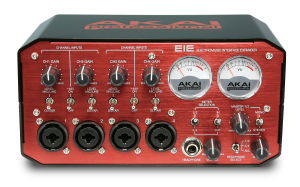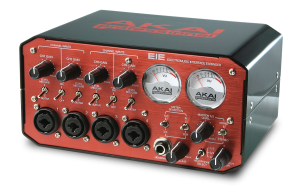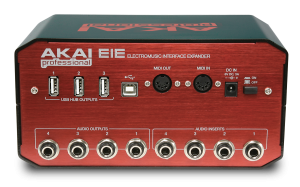I’ve had this device for a month now and I’m very happy with it.
Reviews on the Akai EIE 16 bit version where pretty thin on the ground so buying it was a gamble.
The sound quality seems very good and I’ve not noticed any latency either with midi or audio.
When I record I tend to run with at least 16 tracks and have not experienced crackles, pops or gllitching.
There are 4 inputs on the front which for me is perfect, no rooting around the back to plug mics or instruments in and the inserts on the back make it easy to add external effects, eqs and compressors.
There is phantom power for each input if needed which you’ll need if you have condenser mics.
There are also switches for each input which can switch from mic/line to guitar.
As a long time computer musician I’ve always used pci sound cards, prior to the Akai I was using a Layla 3g and before that a M-Audio 2496.
Both are great audio devices but the problem was that 1. it took up a pci slot which I needed and 2. Not portable.
A big benefit of the Akai EIE is that it is portable, if I need to record in the garage or away from my home I can take it with me and my laptop.
A couple of things I’d like to address,
1. It’s a 16bit recording device as opposed to 24bit – difference? I can’t tell to be honest, as someone who in the past has recorded using a cassette 4-track it’s always going to be a step up. Let’ss face facts, and I’m sure someone is going to jump all over me on this. When you’re recording on a budget or in a small diy studio 16bit is more than adequate.
2. It’s USB 1.0 – I’d always been warned off USB 1.0, potential latency being the main criticism amongst friends but I’ve not noticed any so far. That said I’ve not tried to record more than one track at a time yet so maybe that will come up.
The Akai doesn’t come with drivers, the disc it is shipped with uses ASIO4ALL which seems stable enough to me.
I’m running a bog standard desktop 4gb memory, 3ghz dual processor, 1gb Graphics card and windows 7 64bit and the whole setup with the Akai seems to be working well.
I use Reaper as my DAW and can be running multiple tracks including Sampletank, Garritan and several audio tracks with multiple tracks.
Like I’ve said it works well and Akai seems more than up to the job.
At £130 it’s well worth the cost but if you’re not sure you could tray the Akai EIE Pro – it’s about £70 more expensive but is 24bit and uses USB 2.0
Additional information below.
One convenient box to connect all of your music gear to your computer.
The EIE is all about plug and play convenience. With the EIE tabletop USB audio interface from Akai Professional, you can connect virtually any musical instrument or piece of production gear to your computer. With three convenient USB inputs in addition to its main USB port, EIE enables you to connect controllers, hard drives or any other peripheral to your computer when native ports may be limited. This compact, 16-bit recording interface contains high-quality components including nickel-plated input jacks, analog-style VU meters and a rugged aluminum casing for a powerful, professional, portable audio solution. The EIE can be used with virtually any music software program like GarageBand or Pro Tools and connects plug-and-play to Macs or PCs; there is no driver installation required.
Each channel of the EIE has an XLR-¼” combo jack, dedicated gain-pot and Mic/Line/Guitar switch. The EIE features four discrete-design preamplifiers with 48V phantom power for use with virtually any microphone. Individual ¼” nickel-plated jacks found on the back of EIE provide you with channel inserts for processing audio signals externally. You can monitor sessions on multiple sets of studio monitors using the four ¼” balanced outputs, which are also nickel-plated. Both pairs of outputs can be monitored visually with the high-quality, analog VU meters providing classic features with modern style. For remote tracking and alternative playback, the EIE has a 1/4” TRS headphone output. High quality analog-to-digital and digital-to-analog converters ensure that every detail of your session or performance gets captured and played back faithfully.
The EIE sends and receives four audio channels on a single USB cable for simple, universal interface to your computer. The three additional USB 1.1 ports allow the EIE to function as a hub as well, bridging other MIDI controllers and hard-drives to the computer. EIE’s USB interface is class compliant for plug-and-play operation with Mac OS X and Windows XP, Vista and 7. The EIE features traditional MIDI In and Out jacks for playing and controlling software with keyboard and pad controllers, workstations, and other MIDI-compatible instruments.
- Record and playback 16-bit, 2-channel audio via USB
- Plug-and-play operation, no driver installation required
- Four XLR-¼” combo jacks with phantom power and gain control
- Four nickel-plated ¼” outputs for two separate monitoring systems
- Two classic, high-quality VU level meters with switchable sources
- Three additional USB ports for connecting other devices through to a computer
- 5 Pin DIN MIDI Interface
- Headphone output with switchable source and direct monitoring dial
- Table-top, solid construction with a great-looking, classic design
Includes:
- EIE I/O
- Power cable
- Quick start guide


